A mini facelift, while aiming for a subtle rejuvenation, can unfortunately sometimes lead to complications, especially concerning the neck. A botched mini facelift neck lift can be incredibly distressing, leaving individuals feeling self-conscious and seeking solutions. This comprehensive guide explores the potential issues, recovery options, and steps to take if you suspect a botched procedure.
What are the common complications of a mini facelift neck lift?
Complications following a mini facelift, particularly affecting the neck, can range from minor to severe. These can include:
- Uneven skin: This is a common concern, resulting in an asymmetrical appearance. The skin might appear pulled too tightly in certain areas, leading to a unnatural look.
- Visible scars: While mini facelifts aim for minimal scarring, improperly performed procedures can result in noticeable, raised, or widened scars.
- Skin discoloration: Changes in skin pigmentation, including hyperpigmentation (darkening) or hypopigmentation (lightening), can occur around the incision sites.
- Nerve damage: In rare cases, damage to facial nerves can lead to temporary or permanent changes in facial expression or sensation. This is a serious complication requiring immediate attention.
- Hematoma (blood clots): Collection of blood under the skin can cause swelling, bruising, and pain. Large hematomas may require surgical drainage.
- Infection: Infection, though less common, can occur at the incision sites. Symptoms include redness, swelling, pain, and pus.
- Poor wound healing: Delayed healing or poor scar formation can occur due to various factors, including underlying health conditions or surgical technique.
- Unsatisfactory aesthetic results: This is a subjective concern, but if the results don't meet the patient's expectations or create a disproportionate appearance, it can be considered a complication.
What causes a botched mini facelift neck lift?
A botched mini facelift neck lift can stem from several factors:
- Inexperienced surgeon: Lack of experience and skill is a major contributing factor. Choosing a qualified, board-certified plastic surgeon with extensive experience in facial rejuvenation is crucial.
- Unrealistic expectations: Patients and surgeons must have realistic expectations regarding the outcome of the procedure. A mini facelift won't erase all signs of aging.
- Improper surgical technique: Incorrect incision placement, inadequate tissue manipulation, and insufficient tension release can lead to complications.
- Inadequate pre-operative assessment: A thorough assessment of the patient's facial anatomy, skin elasticity, and overall health is essential for planning a safe and effective procedure.
- Post-operative care neglect: Following the surgeon's instructions meticulously is vital for optimal healing and minimizing complications.
How can I tell if my mini facelift neck lift was botched?
If you are experiencing any of the complications listed above, particularly those affecting the neck, you should consult your surgeon immediately. Significant asymmetry, excessive scarring, persistent pain, or signs of infection warrant prompt medical attention. Don't hesitate to seek a second opinion from another qualified plastic surgeon if you're not satisfied with the results or concerned about the quality of the procedure.
What are my options if my mini facelift neck lift was botched?
Depending on the nature and severity of the complication, various options are available:
- Revision surgery: This may be necessary to correct uneven skin, improve scar appearance, or address other aesthetic concerns. A skilled surgeon can often revise the initial procedure to achieve better results.
- Non-surgical treatments: Treatments such as laser therapy, fillers, or Botox may help to address minor imperfections or improve the overall appearance.
- Medical management: Antibiotics may be necessary to treat infection. Other medications may help manage pain, swelling, or other symptoms.
Can I sue if my mini facelift neck lift was botched?
If you believe your mini facelift was botched due to medical negligence, you might explore legal options. However, it's vital to gather comprehensive medical records, seek legal counsel, and build a strong case before pursuing legal action. The success of a lawsuit depends on proving medical negligence and the resulting damages.
How do I choose a qualified surgeon for a mini facelift or revision?
Choosing the right surgeon is paramount to achieving the desired outcome and minimizing risks. Look for:
- Board certification: Verify the surgeon's board certification by a recognized plastic surgery association.
- Experience and expertise: Review the surgeon's experience in performing mini facelifts and neck lifts. Look at before-and-after photos and testimonials.
- Consultation process: A thorough consultation should involve a detailed discussion of your goals, realistic expectations, and potential risks.
- Facility accreditation: Ensure that the surgical facility meets safety and quality standards.
This information is for general knowledge and should not be considered medical advice. Always consult a qualified medical professional for diagnosis and treatment of any medical condition. Remember that individual results may vary, and the information presented here does not guarantee specific outcomes.
